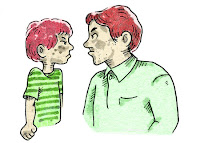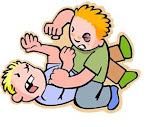Discipline for Cursing and Foul Language

Kids are exposed to curse words in the home, at school, and through various media. At some point these words are going to make their way into your youngster's vocabulary. The trick is to not shield him or her from this inevitable exposure, but to learn how to offer a fair and just consequence that will teach the child that using such words is unacceptable. How you decide to discipline your child for using curse words will depend largely on his or her age – and your personal values. Tips for disciplining children who curse: 1. Avoid using extreme techniques to discipline your kids for bad language. Communicating with your youngster about the importance of using good choices when speaking will encourage him or her to use words that are positive and appropriate. Let your youngster know why bad language is not permitted in your home and the consequences for such behavior. 2. Explaining to your youngster that curse words can be hurtful to others may help him or her under...





